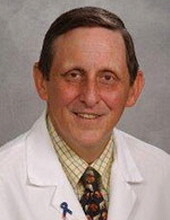

Thomas Roberts Kinney
May 15, 1944 — May 25, 2020
Thomas Roberts Kinney,M.D., a Duke University Distinguished Professor of Pediatrics, died peacefully at Duke Hospital on May 25, 2020 after several years of declining health. Dr. Kinney was 76.
Dr. Kinney was born on May 15,1944, the oldest of four children, in Boston Mass. He was raised in Boston and Cleveland Ohio and moved to Durham in 1959 when his father became Chair of Pathology and Dean of the Duke Medical School. Tom Kinney graduated from The Lawrenceville School in 1962, from Duke University in 1966, and Duke Medical School In 1970. He completed an Internal Medicine internship at Duke and Fellowships in both Pediatric Oncology and Pediatric Hematology at The Children’s Hospital of Philadelphia. From 1974-1978 he was a member of the University of Pennsylvania Pediatric faculty.
In 1978 Dr. Kinney returned to Duke Medical Center where he began a truly outstanding career for the next 42 years.
Dr. Kinney was the Wilburt C. Davison Distinguished Professor of Pediatrics in the School of Medicine, Professor of Pediatrics, and Associate Chair Emeritus in the Department of Pediatrics. In the nearly 50 years since he earned his medical degree at Duke, he made outstanding academic contributions in the area of clinical research in pediatric hematology.
Among his many scholarly contributions, Dr. Kinney led the NIH funded multi-institutional national study that defined the natural history of sickle cell disease. He played a critical role in the implementation of the statewide newborn screening program for sickle cell disease in North Carolina and other southern states. He was co-chair of the Agency for Health Care Policy and Research Panel that developed the national guidelines for newborn sickle cell screening. He also played a leadership role in defining the use of hydroxyurea to treat children with sickle cell disease. As a member of the faculty, he served as the pediatric residency program director, co-director of the medicine-pediatric residency program, and an associate dean in the School of Medicine. He also was the lead physician on the design and construction of the McGovern-Davison Children’s Health Center. More recently, he directed the Children’s Clinical Research Unit that oversees all clinical trials in the Department of Pediatrics.
Recognizing the general needs of children with sickle cell disease as well as other children with chronic diseases, Dr. Kinney forged a relationship with the Pines of Carolina Girl Scouts and organized Camp Kaleidoscope--one of the first summer camps in the country for children with a wide variety of disabling conditions, and a camp that was in place for nearly 40 years. Dr. Kinney received the Excellence in Professionalism Award in 2015 and the Duke Medical Alumni Distinguished Faculty Award in 2013.
Dr. Kinney also made a significant impact on the global management and treatment of sickle cell disease. His research demonstrated the lifesaving benefits of penicillin and Hydroxyurea and several generations of physicians he trained and mentored brought these advances to the global community. Dr. Kinney’s impact on care of sickle cell patients went beyond Duke and North Carolina to tens of thousands of lives saved globally. Duke University honored him by lowering their flags to half staff
Dr. Kinney is survived by his wife of 50 years, Brenda Carlson Kinney, their two children, Thomas Carlson Kinney, and Heather Kinney Brooks, and her husband Morgan Brooks and a large loving extended family. Due to the Covid pandemic the family was only permitted to hold a private family funeral service in their home in June, 2020. In accordance with his wishes, the family spread his ashes over the beautiful waters of his beloved Kerr Lake where the family enjoyed a second home for over 40 years. There will be a Memorial Service celebrating the life of Thomas Roberts Kinney, M.D. at the Duke Chapel when it is reopened. The Duke Pediatrics Department has established The Thomas R. Kinney,M.D. Sickle Cell Center in Dr. Kinney’s honor and donations may be directed to this fund.
Guestbook
Visits: 59
This site is protected by reCAPTCHA and the
Google Privacy Policy and Terms of Service apply.
Service map data © OpenStreetMap contributors



